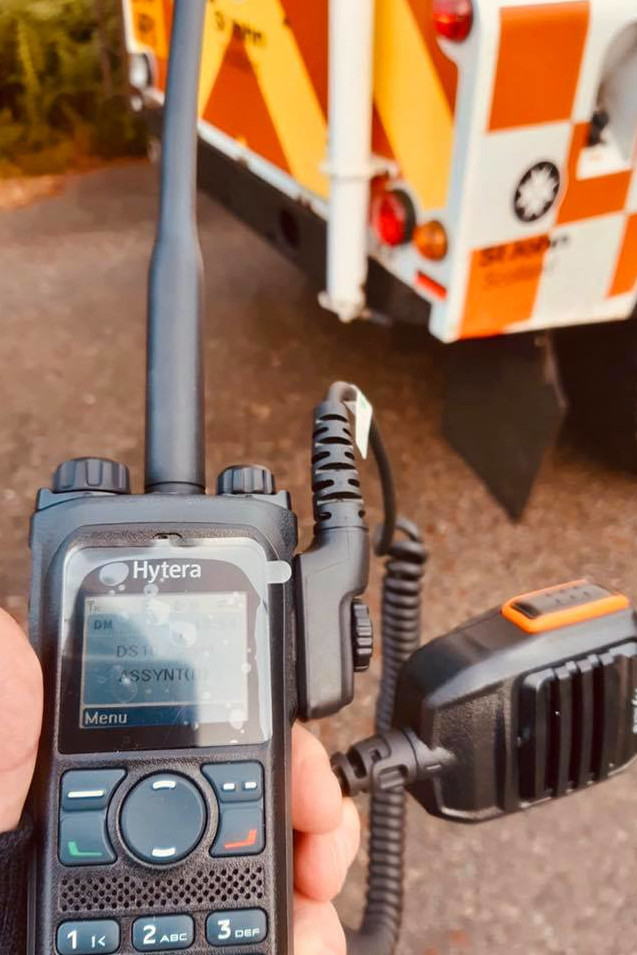Helping to provide life-saving mountain rescue technology
A project to replace vital communications technology used by Scottish Mountain Rescue teams has now been completed, with the help of St John Scotland.
Along with other funders including the Scottish Government and Police Scotland, our support has enabled 24 teams to replace ageing kit which was proving a hindrance to the teams' search and rescue efforts.
The 2004 VHF radios used by the teams until recently had been key in mountain rescues and saving lives across Scotland.
However, over 10 years of use in severe mountain conditions, together with developments in technology, resulted in the need for new radios for the teams. Radios are vital in mountain rescue, providing crucial communication between team members, bases, vehicles and even other organisations such as the Coastguard.
The completion of the project has been the result of several years' work to test and procure appropriate technology which has been described as a "game changer" in the way search and rescue callouts are managed.
Mountain Rescue use a separate VHF radio system, with a number of designated channels and a range of up to 50km if they have line of sight. VHF provides an independent, robust, well-proven network, which is ideally suited for use in remote, mountainous areas and can be deployed anywhere; a key part of the toolkit for individual rescue teams. VHF is preferable to a system which relies on a network of fixed base stations, like mobile phones or Airwave. Airwave is the mobile communications network used by Great Britain's emergency services and the combination of access to Airwave and VHF is complementary.
An independent VHF network is critical in Scotland from a resilience point of view. It functions as an alternative in case of damage to infrastructure, for example base stations, power supplies and satellites, which would render mobile phones and Airwave inoperable. The VHF network can also be used as a complementary, multi-channel network to facilitate the co-ordination of on-the-ground search operations. In major incidents, such as the Grayrigg derailment in 2007, the mountain rescue VHF radios proved a vital resource, as the trackside cables were damaged, taking out police radios and mobile phone networks in the area.
The procurement of the new radios was only made possible by the support of St John Scotland, Police Scotland, and the Scottish Government, who each contributed £100,000.
St John Scotland Chief Executive, Angus Loudon, said: "Our support for Scottish Mountain Rescue teams over the past two decades has made a huge difference to their ability to carry out their duties safely. As a charity we are committed to saving lives and helping communities be resilient, and we know that Scottish Mountain Rescue volunteers do a vital job in supporting their communities and the emergency services. We hope that by having access to these state-of-the-art radios, the teams will not only be safer, they'll be able to help even more people who need them."
Sgt Peter Lorrain-Smith from Police Scotland commented: “Police Scotland were delighted that their £101,000 added to other monies has achieved full funding for new VHF radios. The new radios will help communications and improve safety for mountain rescue teams across Scotland whilst they are responding to lost, missing, and injured hill-walkers and mountaineers.”
In a statement from the Scottish Government, the Cabinet Secretary Humza Yousaf said: “I am well aware that the SMR VHF radio replacement exercise was a huge collaborative effort between Scottish Government, Police Scotland, St John Scotland and the SMR Executive, over a number of years, and it was great to see such a positive example of how, in Scotland, we can work together, across sectors, to improve things for volunteers on the ground.
“St John Scotland, the Scottish Government and Police Scotland each contributed £101,000 over three years to replace the ageing mountain rescue VHF radio equipment, which was coming to the end of its useful life. I was also really pleased that my officials could help with the procurement process, to obtain best value for money and a good maintenance arrangement – the equipment can take a bit of a bashing on the hill, so we need to keep it up to scratch. I am, as always, hugely grateful for the outstanding, vital service the mountain rescue team volunteers provide on a 24/7, 365 basis.”
Damon Powell, Chair of Scottish Mountain Rescue said: “This is another example of the hard work and dedication of our volunteers to make this project such a success. The Radio Working Group members continue to put in long hours, on top of their roles as rescue team members, as well as their day-to-day jobs, to ensure that our rescue teams have the best radios to support their efforts in saving lives.”
You can read more about the new radio technology at the Scottish Mountain Rescue website.

